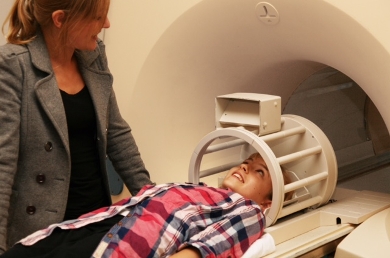
ERC Consolidator Grant for Eveline Crone
Eveline Crone surmises that adolescence also has a positive effect on social development. She believes, for example, that it is in adolescence that young people learn the skills of cooperation, sharing and helpfulness. She will be researching this hypothesis in the coming period with an ERC Consolidator Grant.
Adolescence is often regarded as a period fraught with risk. Young people from 10 to 22 years old are thought to be more prone to substance abuse, delinquency and depression. However, adolescence is not all problems; the majority of adolescents develop into socially minded and socially engaged young adults. For this reason, the focus of Crone’s new research project lies on prosocial development.
More emotional, less rational
Crone: 'For young people adolescence is often a time of quest for identity, a quest that is often fraught with conflict: who am I? All this is tied up with the development of the frontal cortex, the part of the brain that governs various functions such as planning, social behaviour, and impulse control. At the same time, at the onset of puberty the deep cerebral nuclei – which are important for the emotions – are stimulated. This means more activity in the emotional nuclei, whilst the brain areas that are important for rational thinking are still under development.'
Positive news
'Now we know that maturation goes on for much longer than was previously thought, this helps to explain why teenagers are influenced so much by their environment. The positive news is that adolescents’ brains respond not only to the rewards of risk-taking behaviour, but also to other types of reward, such as cooperation and belonging. This opens up possibilities for us to make changes in adolescents’ environments to create better conditions for them to flourish.’

Follow-up research
The new research project, for which Crone has been awarded an ERC Consolidator Grant, is a follow-up to a recently completed study funded with an ERC Starting Grant. In that study Crone followed young people for five years and charted their brain development. This individual approach has emerged as a more accurate way to predict which young people are particularly vulnerable.
Crone: 'The involvement of young participants is extremely important for the success of our research. They came to the lab three times to take part in experiments and interviews. So we’re delighted to have a chance to give them something back: the Braintime Festival.'
Banner: Braintime Festival (Photo Monique Shaw)
Premiere documentary film BRAINTIME
On 29 January 2016 at the Braintime Festival the documentary film BRAINTIME was released. The experienced documentary filmmaker Erik Heuvelink has made a film of young participants through the research period of five years.
